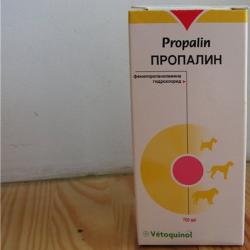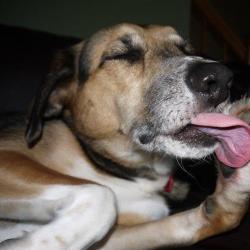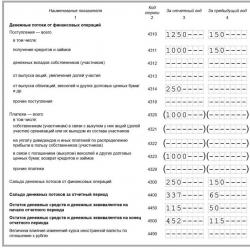Propalin side effects. Propalin for dogs - instructions for use. "Propalin" for dogs, instructions for use
Dogs that develop incontinence present an unpleasant surprise to their owners. Bitches are more often susceptible to the disease; defecation can occur when the animal is suddenly happy in the most unexpected situations and can spoil the mood over and over again when playing with the pet.
Propalin is a product from a French manufacturer.
Propalin, an artificial product from a French manufacturer, is called upon to combat the problem. The drug is aimed at stimulating the corresponding muscles, including the sphincter that closes the urinary system, and can effectively relieve the animal of incontinence.
- with uncontrolled excretion of urine during sleep in puppies and adult dogs;
- for problems caused by sterilization or surgery;
- with incontinence due to old age.
The remedy must be prescribed by a veterinarian, and it must be used either for the recommended period or until a stable, noticeable effect is achieved.
Composition and release form
The drug is produced in the form of a solution in a volume of 30 ml; containers for longer use contain 100 ml of the drug. For simplified use of the product in the required quantity, a dosing syringe is included in the kit.
 Propalin for dogs should be prescribed by a veterinarian.
Propalin for dogs should be prescribed by a veterinarian. The active component of Propalin is phenylpropanolamine mixed with sweetened syrup. The product is a transparent solution without separation into fractions.
Instructions for use
The use of the drug allows for variations, which ensures the convenience of therapy for a particular animal:
- the product is mixed into regular food or, more preferably, given to the dog from a spoon or from a syringe dispenser (some pets may stubbornly resist the latter);
- the dosage is determined in accordance with the weight of the animal: either the dog needs to be given three drops of solution per 4 kg of weight twice a day, or three times a day - one drop for every couple of kilograms;
- if your pet is a large breed and weighs more than 25 kg, then the dosage changes: half a milliliter three times a day or 0.75 ml twice a day;
- It is permissible to reduce dosages when a noticeable effect is observed.
Please note: after use, it is important to avoid using the container and dispenser syringe for purposes other than their intended purpose (they must be thrown away). This is a hygienic requirement and will ensure safe use of the drug. If the product gets on the mucous membranes or skin, it should be washed off immediately. If you swallow it, visit a doctor the same day.
Storage conditions
The storage requirements for Propalin are similar to the standard rules for most drugs:
 Keep the drug out of reach of children.
Keep the drug out of reach of children. - you need to keep the product dry and dark;
- optimal storage temperature is from 15 to 20 °C;
- in a closed package the drug retains its properties for two years;
- After opening, it is permissible to use the medicine only in the first three months.
Caution: Propalin, containers and syringe dispensers from under it must be stored where small children cannot reach them.
Operating principle
Once in the stomach and then in the intestines, the active component of Propalin is quickly adsorbed, acting in full force within two hours after use. It is delivered with blood to the desired area, where it stimulates the receptors and muscle tissue of the urethra. This reduces incontinence and allows the animal to completely empty its bladder. The substances of the drug are eliminated naturally.
Contraindications
Propalin has a number of restrictions, and the safety of use is maintained only if they are observed:
- Treatment of pregnant dogs is prohibited. You will also have to abstain from treatment with this remedy during the period of feeding puppies.
- Animals should not be given other medications at the same time as Propalin. Exceptions are possible, but require mandatory discussion with your veterinarian.
- Individual intolerance to the components of the drug may interfere with the treatment of some dogs.
 This drug is contraindicated for pregnant dogs.
This drug is contraindicated for pregnant dogs. Attention: if the animal has problems with the health of the urethral sphincter, the problem will have to be solved without the use of Propalin.
Side effects
Violation of the rules of use, non-compliance with recommended dosages, or use of a drug with an expired shelf life can negatively affect the condition of the animal. Also when taking Propalin, since a negative reaction to the drug cannot be ruled out in each specific case.
This is important: if you notice side effects or the dog clearly feels unwell after taking it, you must urgently show the animal to a veterinarian.
What can be replaced
Veterinarians often prescribe the use of Propalin, but it is not always found in pharmacy chains. At the same time, Propalin is ideal for treating dogs and copes with the task as gently as possible.
If you have not found the medicine you need, it is permissible to use any of its closest analogues: Dietrin or Ovestin:
| Drug name | Dietrin | Ovestin |
| Description | The product, produced in the USA, can be purchased at a regular non-veterinary pharmacy chain. It is used to treat incontinence problems in humans, but will also help your dog. | Used in the treatment of a number of gynecological diseases. |
| Release form | Capsules | Three options are available: ointment, suppositories and tablets. |
| Active substances | The same as in Propalin, phenylpropanolamine and benzocaine in the amount of 75 and 9 milligrams, respectively. That is, the capsule contains the same amount of active substance as one and a half milliliters of Propalin. | Natural estrogen |
| Mechanism of action | You will have to calculate the dosage yourself (it makes sense to consult a veterinarian). The principle of therapeutic effects of Propalin and Dietrin is similar; the latter is also given to dogs before weighing. | Estrogen (female hormone) contained in the drug eliminates age-related problems and hormonal deficiency, including restoring tone to the corresponding muscles of the dog. |
| Price | If you buy an analogue of Propalin, you can spend 1500-2000 rubles. | |
Price
Typically, Propalin is affordable - for 30 ml of the product you will have to pay around 400 rubles. A 100-liter package will cost more – about 800 rubles. So treating a pet with veterinary drugs, and not with one of the analogues used in human therapy, will cost significantly less.
In this article I will talk about the drug propalin for dogs. I will explain in what form it is produced, how it is used, why it is prescribed, and how the dosage is calculated. I will describe the instructions for use, side effects of the drug and contraindications for its use. I will write how the medicine is stored, how much it costs and what analogues there are.
Propalin is a veterinary drug. Prescribed to dogs for urinary incontinence.
Propalin is produced in the form of syrup in plastic bottles of 30 and 100 ml.
The active component of the drug is phenylpropanolamine hydrochloride.
Indications for use and mechanism of action
Propalin is prescribed to dogs for urinary incontinence caused by physiological disturbances in the functioning of the sphincter.
These problems are:
- Congenital. Observed in dogs of the following breeds: , Labrador, . In male dogs it is diagnosed in 20% of cases when visiting a veterinarian.
- Acquired:
- occur in pets during the postpartum period. Due to the fact that after numerous whelpings or during the birth of a large litter, muscle tone in the urethral area is lost;
- appear in old age in dogs;
- are a consequence of infectious diseases.

If another disease develops in the animal, leading to urinary incontinence, the drug will not be effective. In this case, it is necessary to treat the underlying disease that contributed to the onset of the disease.
The mechanism of action of the drug is due to the properties of phenylpropanolamine. The substance affects the sympathetic nervous system, which is responsible for unconditioned reflexes. After taking the drug, the pet's sphincter begins to tighten more strongly around the urethra, and urine stops involuntarily flowing out.
The active substance reaches its maximum concentration in the blood plasma an hour after entering the body. It is excreted unchanged in the urine.
Dosage and method of administration for dogs
The dosage and course of treatment are determined by the veterinarian based on the clinical picture of the disease and the weight of the animal.
On average, medication intake is calculated as follows:
- when used three times for small dogs and breeds - 2 drops per 1 kg of dog weight in 1 dose;
- with a double dose for dogs of small and medium breeds - 3 drops per 1 kg of weight in 1 dose;
- when used three times for large breed dogs (over 25 kg) – 0.5 ml of the drug per dose;
- with a double dose for dogs of small and medium breeds (over 25 kg) - 0.75 ml per 1 dose.
The medicine is given orally during feeding. To reduce the risk of side effects, the daily dose of the drug is divided into several doses. The medicine must be given regularly, at the same time. It is not recommended to skip doses to avoid a decrease in the therapeutic effect.
Weakness of the sphincter muscles cannot be treated with medications. Therefore, the effect of propalin occurs only during treatment.
When the medication is discontinued, the dog's involuntary urination resumes. In this connection, propalin is prescribed to pets for life.

Side effects
When taking the drug, a large number of side effects may occur, such as:
- diarrhea;
- stimulation of the nervous system;
- increased heart rate;
- increased blood pressure;
- the occurrence of shortness of breath;
- manifestation of allergic reactions.
In case of an overdose, a severe deterioration in the dog’s condition is possible, which is dangerous to his health. It may appear in the form:
- severe tremor;
- fainting;
- lethargy.
Contraindications for use
The medicine must not be used if:
- pet pregnancy;
- during lactation;
- diabetes mellitus;
- liver and kidney diseases;
- individual intolerance.
Before using propalin simultaneously with other medications, you must consult your veterinarian.
It is forbidden to use propalin together with:
- atropine;
- non-steroidal anti-inflammatory drugs;
- beta blockers;
- insulin.
Storage conditions and expiration dates
Propalin is stored in closed packaging for two years at a temperature of +15 to +25 degrees C in a place protected from sunlight.
After opening the bottle, you can store the medicine for no more than three months at room temperature. After this period, it is prohibited to use the medicine.
 Shelf life of Propalin is 24 months
Shelf life of Propalin is 24 months Price and analogues
The cost of propalin is approximately 700 rubles for 30 ml and 1,700 rubles for 100 ml.
Analogue – Dietrin.
In the article I talked about the drug Propalin for dogs. She explained in what form it is produced, how it is used, why it is prescribed, and how the dosage is calculated. She described the side effects and contraindications for taking it. I wrote how the medicine is stored, how much it costs and what analogues there are.
Instructions for use of the drug Propalin for functional insufficiency of the urethral sphincter in sterilized bitches
(manufacturer company Vetoquinol S.A. / Vetokinol S.A., France)
I. General information
Trade name of the drug: Propalin.
International nonproprietary name: phenylpropanolamine hydrochloride.
Dosage form: solution for oral use.
Propalin as an active ingredient contains phenylpropanolamine hydrochloride (norephedrine) - 50 mg/ml, and as an auxiliary component sorbitol solution (70%) - up to 1 ml.
Propalin is produced packaged in 30 and 100 cm 3 plastic bottles of appropriate capacity, which are packaged individually in cardboard boxes complete with a dispenser syringe and instructions for use.
The shelf life of the drug, subject to storage conditions in a closed package, is 24 months from the date of manufacture, after opening the bottle - no more than 3 months.
The medicinal product must not be used after the expiration date.
Store the drug in the manufacturer's sealed packaging, separate from food and feed, in a dry place, protected from direct sunlight, at a temperature of 15°C to 25°C.
Propalin should be stored out of the reach of children.
No special precautions are required when disposing of unused, expired medication.
II. Pharmacological properties
Propalin belongs to the group of synthetic sympathomimetics of the amine group. Phenylpropanolamine hydrochloride, which is part of the drug, acts mainly on alpha-adrenergic receptors, indirectly increases the release of norepinephrine (norepinephrine) from the depot and, acting directly on the smooth muscles of the lower urinary tract, increases tone and enhances contraction of the urethral sphincter.
After oral administration, it is quickly absorbed from the gastrointestinal tract, reaching maximum concentration in the blood plasma after 1-2 hours. It is excreted from the body in urine in unchanged form and in the form of inactive metabolites.
In terms of the degree of impact on the body, propalin is classified as a moderately hazardous substance (hazard class 3 according to GOST 12.1.007-76), in recommended doses it does not have a local irritating effect, and if it gets into the eyes it can cause irritation.
III. Application procedure
Propalin is prescribed to sterilized (after ovariectomy/ovariohysterectomy) bitches with urinary incontinence associated with functional insufficiency of the urethral sphincter.
A contraindication to the use of Propalin is the animal’s individual hypersensitivity to the components of the drug, including a history of it.
Propalin is administered to dogs daily on a continuous basis, during feeding, two to three times a day at the rate of 0.3 ml of the drug per 10 kg of animal weight twice a day or 0.2 ml of the drug per 10 kg of animal weight three times a day, which corresponds to 1 mg of fepilpropanolamide hydrochloride per 1 kg of animal weight.
No symptoms of overdose have been identified in dogs.
As a rule, there are no side effects or complications when using Propalin in accordance with these instructions. In case of increased individual sensitivity of the animal to the components of the drug and the manifestation of allergic reactions, the use of Propalin is discontinued.
If one or more doses of the drug are missed, its use is resumed in the same dosages and according to the same regimen.
Propalin should not be used concomitantly with other sympathomimetics, anticholinergics and tricyclic antidepressants.
IV. Personal prevention measures
When carrying out therapeutic measures using Propalin, you should follow the general rules of personal hygiene and safety precautions provided for when working with medications.
If the drug accidentally gets on the skin or mucous membranes, it should be washed off immediately with a stream of water; if it gets inside, consult a doctor.
The use of drug bottles for household purposes is not allowed.
"Propalin" is a frequently prescribed medicine in veterinary medicine, intended for complex therapy in the treatment of enuresis in dogs caused by functional insufficiency of the urethral sphincter. The drug is manufactured in the form of syrup by the French company Vetoquinol S.A.
"Propalin" for dogs, instructions for use
"Propalin" is a French medicine used for involuntary urination and urethral leakage in female dogs during estrus. as a result:
- past infectious disease;
- weakening of the bladder tone;
- with age-related changes;
- adverse reaction after sterilization of an animal.
"Propalin": composition
 An important active substance is phenylpropanolamine hydrochloride. This substance acts on receptors that promote contraction and increase the tone of smooth muscles, and also constricts blood vessels.
An important active substance is phenylpropanolamine hydrochloride. This substance acts on receptors that promote contraction and increase the tone of smooth muscles, and also constricts blood vessels.
Propalin is produced in the form of a syrup, which makes it easy to add to food. Each package contains a dispenser syringe. The drug is available in dosages of 100.0 ml and 30.0 ml.
Treatment with Propalin begins only as prescribed by the attending physician. It is safe for dogs and is excreted in feces and urine. The effect occurs a few hours after taking the medicine.
Operating principle
After taking the drug, the drug is rapidly absorbed into the blood. After 2 hours, the active substances begin to have a healing effect on the smooth muscles of the bladder and urethra, toning them and stimulating the contraction of muscle tissue.
Dosage
The dosage is prescribed taking into account the weight of the pet:
- 3 drops of medicine are given to a dog per 4 kg of weight (twice a day);
- for 2 kg of weight - 1 drop three times a day;
- for a pet 25 kg and heavier - prescribe 0.75 ml per 25 kg of weight 2 times a day.
Increasing the dose does not improve the effectiveness of treatment, but leads to complications.
- The drug is given along with food;
- The duration of treatment is determined solely by the veterinarian;
- The opened drug is ready for use within 3 months if stored correctly. The recommended temperature is not lower than +15 ° and not higher than +25 °.
When using the drug must adhere to:
- rules of personal hygiene;
- Dispose of empty bottles and dispensing syringes immediately after use and do not use them in domestic conditions;
- keep away from children in protected places.
Complications after overdose and contraindications to the use of the drug
This drug is prescribed by a veterinarian, who must warn the dog owner about possible complications and contraindications.
The drug is contraindicated in:
- pregnancy and lactation;
- if the dog has hypersensitivity to the components included in the medication;
- if the dog has previously taken antidepressants.
Dangerous complications can occur if the dose is not followed. This may lead to:
- shortness of breath;
- pupil dilation;
- the dog becomes aggressive and irritated.
If complications occur, you should immediately consult your doctor.
"Propalin" for dogs, analogues
 "Propalin" is a medicinal product that uses in great demand among dog owners and very often it happens that it is difficult to find. In addition, the price of this drug is not low.
"Propalin" is a medicinal product that uses in great demand among dog owners and very often it happens that it is difficult to find. In addition, the price of this drug is not low.
When purchasing an analogue, you must consult a veterinarian.
For a temporary or permanent replacement of “Propalin”, “Dietrin” is suitable, which contains phenylpropanolamine hydrochloride.
The substitute should be used after reading the instructions, following the dosage and recommendations of the veterinarian.
There are two forms of Dietrin" - one dietary supplement made from natural plant ingredients (this medicine will not benefit your pet). And “Dietrin”, which includes phenylpropanolamine hydrochloride.
There is another drug that can replace Propalin - Trimex. But there are difficulties in purchasing it, since it is sold only with a doctor's prescription.
As a last resort, you can replace it with the antispasmodic “Vizikar”, it reduces the muscle tone of the urinary tract. “Driptan” and “Sibutin” give the same effect.
There are cases when none of the above drugs gives a positive result, or they are difficult to get, and then they come to the rescue female hormonal drugs:
- "Ovestin";
- "Marvelon";
- "Livial."
 The effect of these drugs occurs by increasing the tone of the bladder sphincter, and the bladder also relaxes, which leads to rapid recovery. But when taken, a number of side effects may occur that occur with hormonal therapy. It is imperative that you consult your veterinarian before giving these medications.
The effect of these drugs occurs by increasing the tone of the bladder sphincter, and the bladder also relaxes, which leads to rapid recovery. But when taken, a number of side effects may occur that occur with hormonal therapy. It is imperative that you consult your veterinarian before giving these medications.
There is a pet, cat or dog, in almost every home. Animals, like people, are susceptible to various diseases. So, dogs can develop urinary incontinence over time. Most often, this disease occurs in females. Fortunately, there are now medications that can effectively treat incontinence, such as propalin. Analogues of this remedy, as practice shows, are much easier to find than the original drug itself. However, before using propalin analogues for dogs or the original drug, you should consult with a specialist and also study the instructions for its use.
Composition and release form
Propalin is produced in the form of a sweet transparent syrup in 30 or 100 ml bottles with a dispenser syringe included. Main active ingredient The drug contains phenylpropanolamine. This substance affects the muscles of the urinary system, stimulates them and thereby relieves the animal from incontinence.
Indications for use
Propalin is prescribed by veterinarians in the following cases:
- Sleep incontinence in adult dogs and puppies.
- Incontinence in bitches after sterilization or surgery.
- Uncontrolled urination in elderly individuals.
Instructions for dogs
It is important for owners of dogs with urinary incontinence to remember that only a doctor can prescribe propalin. The instructions for use of this drug provide only general information, while the dosage should be selected for each animal individually depending on age, body weight and other characteristics.
Among the general information about the use of the drug in the instructions, the following are highlighted:

Side effects
With the correct dosage and use of a drug with a normal shelf life, only one side effect can occur - allergic reaction due to individual intolerance individual components of the drug.
Main contraindications
Like any medicine, propalin has a number of contraindications for use. It cannot be used in the following cases:
- The period of pregnancy and feeding of puppies.
- Together with other medications, exceptions can only be made as prescribed by a veterinarian.
- In case of individual intolerance to animals of individual components of propane.
- For diseases of the urethral sphincter.
Propalin is undoubtedly one of the most effective remedies for eliminating urinary incontinence in animals. However, it cannot always be found in veterinary pharmacies. In this case, the doctor can replace it with an analogue. The following are analogues of propane for dogs:

It is worth noting that the declared analogues are much more expensive than the original drug. It is noteworthy that what in regular pharmacies You can find the drug propalin, which is intended for the treatment of liver diseases in humans and has nothing in common with propalin for dogs. The composition of propolin includes propolis, which is how it gets its name.
Reviews about the medicine
On the Internet you can find a lot of reviews from dog owners about the drug propalin, most of them are positive.
 After sterilization, we encountered the problem of urinary incontinence in the dog. Our Daisy left traces of urine all over the apartment, a smell appeared, and we had to rush to the vet. The doctor prescribed a course of propane. Our girl took the medicine in its pure form quite normally, the leakage of urine stopped within a week after starting treatment. I recommend this remedy to all dog owners who are faced with the same problem, but after consulting a specialist, since the dose must be calculated individually.
After sterilization, we encountered the problem of urinary incontinence in the dog. Our Daisy left traces of urine all over the apartment, a smell appeared, and we had to rush to the vet. The doctor prescribed a course of propane. Our girl took the medicine in its pure form quite normally, the leakage of urine stopped within a week after starting treatment. I recommend this remedy to all dog owners who are faced with the same problem, but after consulting a specialist, since the dose must be calculated individually.
Alla, Moscow
The children brought their dog to the dacha. After some time, a specific smell of urine appeared. At first they thought she was urinating on purpose, but then they realized that the animal was suffering from incontinence. I had to go to the veterinarian, who prescribed a dose of propalin. After a course of treatment the problem disappeared. A very good and effective product.





